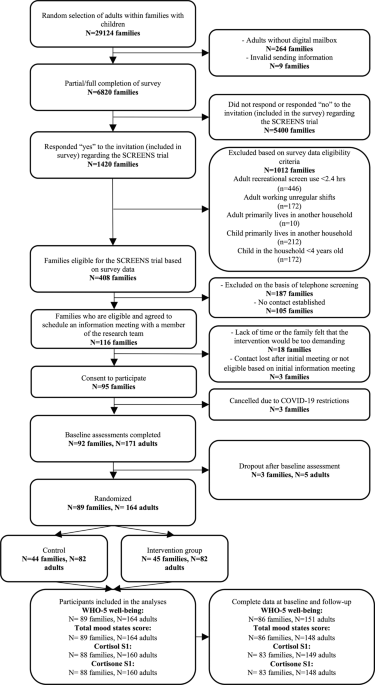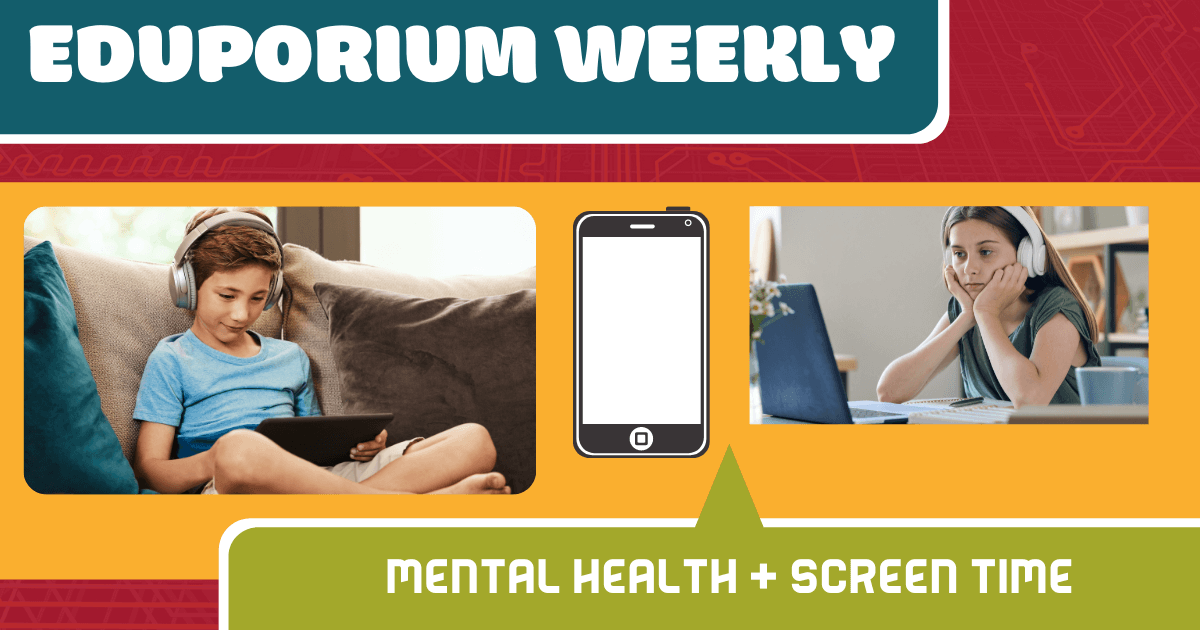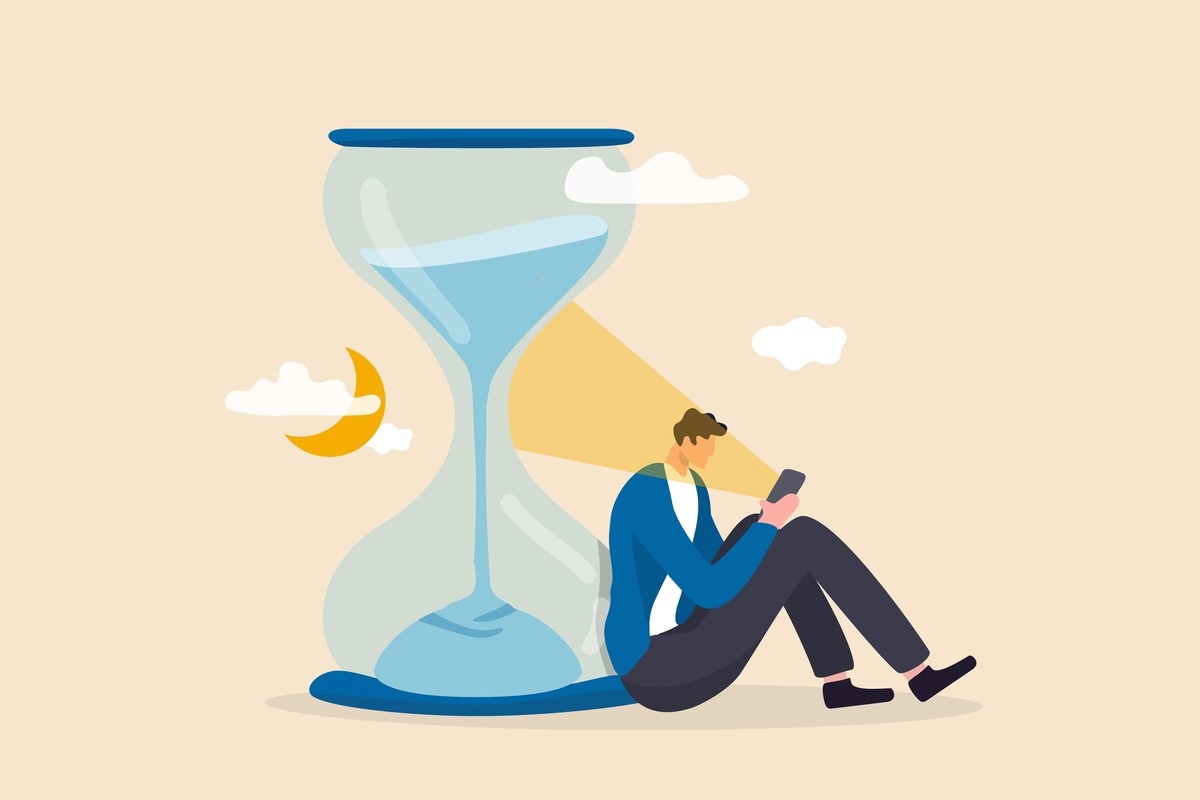Explore web search results related to this domain.
: In a world dominated by screens, unravel the impact on mental health. From social media challenges to the blue-light dilemma, this blog explores the nuances of screen time. Dive into strategies for a healthy digital diet and mindful tech practices and seek support when needed.
In the bustling landscape of the digital age, where screens have become an integral part of our daily lives, the impact on mental health cannot be overlooked. As we seamlessly transition between devices, from smartphones to laptops, the lines between the virtual and the real blur. While technology has undoubtedly brought convenience and connectivity, understanding the delicate balance between screen time and mental well-being is crucial in this digital era.The constant barrage of information, social media pressures, and the sedentary nature of screen-based activities contribute to a complex web of challenges for mental well-being. ... The allure of social media often comes with a cost. The constant comparison, fear of missing out (FOMO), and pressure to present a curated version of life contribute to increased stress levels. Navigating the digital realm requires mindfulness to avoid the pitfalls of social media's impact on mental health.If screen time begins to significantly impact your mental health, don't hesitate to seek support. Professional help, such as counseling or therapy, can provide valuable strategies for navigating the digital landscape while safeguarding mental well-being.By fostering awareness, setting boundaries, and incorporating mindful practices, we can navigate the digital landscape with greater resilience and well-being. The key lies in embracing the positive aspects of technology while actively mitigating its potential negative impact on our mental health. As we strive for a balanced digital diet, let's ensure that screens enhance, rather than detract from, our overall wellness in this rapidly evolving digital era.


U.S. wellness clinics sold to Stella, including a data-sharing partnership to launch a technology-driven clinic management solution for mental health care...
U.S. wellness clinics sold to Stella, including a data-sharing partnership to launch a technology-driven clinic management solution for mental health care providers.Numinus Wellness Inc. (TSX: NUMI) helps people to heal and be well through the development and delivery of innovative mental health care and access to safe, evidence-based psychedelic-assisted therapies.Numinus Wellness clinics acquired by Stella for US$3.53 million · Numinus focusing on business units and product development ("Numinus Network") to facilitate clinic efficiency and care reimbursement for mental health practitioners("Numinus" or the "Company") (TSX: NUMI) (OTCQX: NUMIF) (FSE: LR23), a mental healthcare company advancing traditional and innovative behavioral health treatments including safe, evidence-based psychedelic-assisted therapies, announces the closing of the previously announced definitive agreement with Stella, an interventional psychiatry practice focused on treating PTSD, anxiety and depression with biological modalities, of the sale of the Company's five Wellness Clinics in Utah for US$3.53 million. "Stella and Numinus are very much aligned in terms of standards of care and a focus on optimize

/PRNewswire/ -- PetVet Care Centers (PetVet), a leading network of 450 veterinary practices across the United States, has donated $485,000 to support Not One...
7, 2024 /PRNewswire/ -- PetVet Care Centers (PetVet), a leading network of 450 veterinary practices across the United States, has donated $485,000 to support Not One More Vet (NOMV), a non-profit organization dedicated to transforming mental wellness in the veterinary profession. This significant contribution highlights PetVet's commitment to partnering with NOMV to expand mental health resources, education, and support for veterinary professionals nationwide.Gino Volpacchio, PetVet Care Centers Chairman & CEO, emphasized, "At PetVet, the health and wellbeing of our veterinary teams and staff is a core value. We recognize the incredible work NOMV does to promote mental health in our industry, and we're proud to partner with them to provide resources that directly impact the lives of veterinary professionals.This support will enable NOMV to expand our reach, help more veterinary professionals, and continue our initiatives for sustainable mental wellness in the industry. Together with PetVet, we can effectively address the unique mental health needs of veterinary teams and make a lasting difference." About PetVet Care Centers PetVet Care Centers is a leading network of veterinary hospitals committed to compassionate, high-quality care for pets across the United States.It provides robust business support that empowers local leaders, enabling its practices to prioritize exceptional patient care while upholding their unique values and legacy. The company is equally dedicated to team wellbeing, exemplified by initiatives like the PetVet Wellbeing Group, which is focused on providing comprehensive mental health support and resources for its 12,000 team members, including more than 3,000 DVMs.
Studies have linked higher digital screen use with poorer mental health. However, there is limited experimental evidence to suggest a causal relationship. In this trial, we aimed to investigate the effects of limiting recreational digital screen use on mental well-being, mood, and biomarkers ...
Studies have linked higher digital screen use with poorer mental health. However, there is limited experimental evidence to suggest a causal relationship. In this trial, we aimed to investigate the effects of limiting recreational digital screen use on mental well-being, mood, and biomarkers of stress in healthy young and middle-aged adults.Finally, findings may not be generalizable beyond healthy adults who live in households with children. Collectively, our study provides experimental evidence that limiting recreational digital screen use positively affects mental well-being and mood in adults. Our findings highlight the importance of awareness of the amount of time adults spend using recreational digital screen media devices.npj Mental Health Research - Effects of limiting digital screen use on well-being, mood, and biomarkers of stress in adultsParticipants had to provide one of the following answers: All of the time (5), most of the time (4), more than half of the time (3), less than half of the time (2), some of the time (1), at no time (0). The final score was calculated for each adult by adding the scores from the five items and multiplying the raw sum by 434. Higher scores correspond to better mental well-being. Overall mood states were assessed using the Profile of Mood States questionnaire, which is a validated and widely used scale to assess mood states in healthy populations47,48.


/PRNewswire/ -- The Premise Health Digital Wellness Center has become the first digital wellness center to receive accreditation from the Accreditation...
BRENTWOOD, Tenn., Oct. 1, 2024 /PRNewswire/ -- The Premise Health Digital Wellness Center has become the first digital wellness center to receive accreditation from the Accreditation Association for Ambulatory Health Care (AAAHC).Premise Health is also the only organization to win AAAHC's Bernard Kershner People's Choice Quality Award three times. ... Premise Health serves large organizations and their people with exceptional healthcare. It partners with commercial and municipal employers, health plans, unions, and tribes, serving millions of members at more than 800 wellness centers in 46 states and Guam. Premise's mission is to help people get, stay, and be well. With more than 30 types of care, it provides easy access to amazing member experiences that improve health and lower healthcare costs.With 106 AAAHC accredited worksite locations, Premise, the leading direct health care company, also holds the largest number of accredited worksite locations. "Becoming the first virtual care platform to be accredited by AAAHC is a ringing validation of the high-quality care and attention to safety our people strive to provide every day," Jonathan Leizman, M.D., chief medical officer, said. "Our Digital Wellness Center meets our members where they are with convenient care from dedicated providers.Additionally, because our members can form relationships with a Premise virtual provider, they can benefit from consistent, long-term care for a variety of health concerns." Premise's Digital Wellness Center cares for members with primary care, behavioral health, occupational health, pharmaceutical and care management and navigation needs.
Learn how to reduce excessive screen time for better health. Excessive screen time can have significant physical impacts on individuals of all ages, contributing to a host of health concerns.
Achieving digital wellness doesn’t mean completely unplugging from the online world. Think of it more as finding the sweet spot between screen time and mental health. When we recognize how too much screen time can affect us, and try some helpful detox tricks, we can take charge of our lives.Excessive screen time doesn’t just take a toll on our physical health; it can also significantly affect our mental well-being.No matter how we use our devices, most of us spend more time than not eyes-deep in our screens—often to the point of sacrificing healthier habits. In this comprehensive guide, we’ll delve into the impacts of too much screen time, how it can detrimentally affect our well-being and productivity, and, most importantly, offer strategies for achieving digital wellness through a balanced approach to technology.As you embark on your digital wellness journey, we’re here to provide the tools you need to combat screen addiction. At Freedom, we offer a comprehensive solution, enabling users to regain control over their digital habits and prioritize their well-being. Sound good? Start your free trial today and take the first step towards a healthier relationship with technology.

Call 1-800-950-NAMI (6264) M–F, 7 a.m.–3 p.m. PT for free mental health info, referrals and support. ... Do you pick up your phone to check the news and find yourself getting lost down the virtual rabbit hole of comments on a post about a subject you don’t even care about?
Call 1-800-950-NAMI (6264) M–F, 7 a.m.–3 p.m. PT for free mental health info, referrals and support. ... Do you pick up your phone to check the news and find yourself getting lost down the virtual rabbit hole of comments on a post about a subject you don’t even care about? Are you stressed out from doomscrolling? Blurry-eyed with a kink in your neck every night from staring at screens all day long?To maintain balance and peace of mind, I’ve learned about the need to set screen-time limits and disconnect often. It comes down to boundaries for me, with time and space. Here are some specific tips that help me manage my screen time to maintain good mental health.Our focus is pulled in multiple directions during the day and the options available on our devices can make us more distracted. Watching TV while also scrolling on your phone or tablet or clicking around on your computer means your attention is divided. Ask yourself, is that time well spent? Consider one screen at a time, one activity at a time.Next time you reach out to lazily consume an endless stream of photos that blur together, pause and change course. Call a loved one, dance to a favorite song, or choose to spend time on one of the self-care activities that make you feel good. Reducing your screen time can be easier if you find satisfaction with other, more fulfilling activities.

While many other pandemic-induced ... of skyrocketing screen time have also caught up with many students. As we continue to hone in on student mental health concerns, it’s important that parents and educators work together to help keep digital wellbeing in focus...
While many other pandemic-induced issues, like equity, isolation, relationships, and SEL have been some of the key focal areas, the effects of skyrocketing screen time have also caught up with many students. As we continue to hone in on student mental health concerns, it’s important that parents and educators work together to help keep digital wellbeing in focus.Brought on by our reliance on technology for work, convenience, and learning, the Google team started the Digital Wellbeing campaign. Essentially, the movement helps raise awareness when it comes to the amount of time we spend using technology, looking at screens each day, and the resulting mental health effects it's had on children.If we’re constantly receiving notifications, it's very distracting—especially for those trying to focus on staying away from screens. One solution is to pause notifications until a predetermined time (say 12 PM) so that they’re not constantly coming in. This is something that’s beneficial among both teachers and students and, hopefully, helps keep everyone's mental health strong. Eduporium Weekly | The Digital Divide And Learning · Digital wellness is so important all the time but it certainly has a different feel as we continue navigating the pandemic era.Devices can provide indications of when to scale back screen time, how eye strain could perpetuate, when to increase physical activity, and how to achieve better sleep. All those factors go into sustaining mental health and pretty much all weren't on the radar a few years ago. As we learn more about the impacts that constant technology usage has, however, it's become much more important. Also, digital wellness means different things for teachers than for students.


Discover the positives and harms of social media, benefits of taking a digital break, and how a digital detox in 2025 can improve your mental health and well-being in the long run.
After all, mental and physical well-being remains our top priority, therefore, we must disconnect from this medium more often. As we step into 2025 it is a great opportunity to embrace a digital detox. By taking a break from digital devices this year, why not allow yourself to reset, refocus, and reconnect with the world around you? In this read let us look at its pros and cons and how to do this activity as often as possible. Also Read: Therapy For Mental Health: The Most Common Psychological Conditions That Might Need Immediate HelpDigital detox refers to taking a break from screens like mobile phones, computers, and social media to improve mental and physical health, aid restful sleep, and boost creativity by limiting screen time. It also encourages us to engage in offline activities like reading, exercising, and spending quality time with our loved ones. A regular digital detox can enhance overall well-being and create a healthier balance between technology and real-life experiences.To Augment Your Mental Health And Sharpen Memory, Buy From Our Wide Range Of Nutritional Supplements · A perfect time to start something that will let you reclaim time spent scrolling mindlessly, as you shift your attention to tasks that truly matter, a small Digi-detox promise in 2025 is an ideal way to sharpen your focus, enhance productivity, improve body posture, and encourage physical activity. Take a look at some well-known holistic incentives for staying away from screens:Also Read: Neuro Radiance: Blending Beauty Rituals With Mental Wellness. 7 Ideas To Get Glowing From Within · A valuable tool for achieving greater balance, health, and fulfillment in the months ahead, when planning to detox from technology, begin with short breaks, gradually increasing screen-free time to avoid feeling overwhelmed, and maintain consistency.

How the time change can affect your mental and physical health might explain why you dread it.
Along with mental health, there's ample evidence suggesting that DST impacts our bodies physically as well. Let's start with your sleep cycle. In the spring, when you adjust your clocks ahead one hour, it can throw off your body's internal clock because you go to bed later and wake up sooner than usual.DST also impacts physical activities as well. Because you might experience more fatigue from a lack of sleep, you're less inclined to take up more physically demanding exercises, which can improve your physical and mental health. Also, because your body might be sleep-deprived, it can produce higher levels of cortisol -- the stress hormone.John Hopkins notes that during daylight saving time, people experience more stress, increasing traffic fatalities, hospital admissions for severe health impacts like strokes and heart attacks, and much more. · Our guide delves into how daylight saving time impacts your body, from a mental and physical perspective.When your body doesn't receive enough sleep, it impacts the frontal lobe of your brain. Think of your frontal lobe as your best friend who doesn't let you act out on impulses. Well, when you don't sleep well or receive enough of it, it impacts your frontal lobe's ability to make sound decisions.
Whether for work, social interactions, ... in digital tools. I completely understand, especially with my business heavily reliant on social media! While the benefits of technology are undeniable, excessive screen time can harm our mental health, emotional health, and physical well-being. Finding the right balance between screen use and self-care practices ...
Whether for work, social interactions, or entertainment, it’s easy to spend hours each day immersed in digital tools. I completely understand, especially with my business heavily reliant on social media! While the benefits of technology are undeniable, excessive screen time can harm our mental health, emotional health, and physical well-being. Finding the right balance between screen use and self-care practices is key to maintaining a healthy balance in life.Remember, self-care in the digital era is about finding the right balance between the convenience of technology and the need for real-world connection and holistic well-being. Embrace a balanced approach to tech use, where screens enhance your personal growth without overshadowing the importance of mental, physical, and emotional health.Additionally, use these breaks to stretch, hydrate, or take a short walk, .supporting both your physical and mental health · Balance screen time with offline hobbies and activities that bring you joy and relaxation. Whether it’s reading a book, cooking a meal, gardening, or practicing a creative pursuit, these activities provide a healthy contrast to digital engagement and nourish your soul. Intuitive eating encourages listening to your body’s signals and responding with care.Having worked with hundreds of clients to build a healthier relationship with food, stop dieting, and achieve sustainable weight loss (including maintaining my own 10-pound loss), I’ve seen firsthand how digital consumption pulls us away from being present with our bodies. Scrolling through social media, we’re bombarded with others’ needs, losing sight of our own, and often turning to food as an emotional crutch. Setting clear boundaries and prioritizing our mental well-being is the first step to reclaiming control. Before diving into strategies for managing screen time, it’s important to recognize its potential impact on your health:

Although digital devices offer convenience it is important that we find the right balance between using technology and personal well-being.
This blog looks at teaching digital wellness, exploring why it is important, and how schools and parents can work together to impart these important skills upon students. Join us in celebrating and embracing Safer Internet Day’s mission of creating a healthier, more secure online world for all and coming together for a better internet. First, we need to understand the impact excessive screen time can have on our physical and mental health.Prolonged use of screens has been linked to eye strain, sleep deprivation, and even adverse effects on mental well-being. There is substantial evidence suggesting these correlations with direct associations between excessive screen time with mental health concerns, such as anxiety, depression, and disturbances in sleep patterns.Although these functionalities offer convenience for many it is also important that we find the right balance between using technology and personal well-being. “Every year, Safer Internet Day serves as a timely reminder to reflect on our digital habits and adopt practices that promote a healthier digital lifestyle.”Let’s work together for a better internet by consistently reflecting on our digital habits, we will all be better equipped to make informed decisions and maintain a healthier relationship with the seemingly ever-increasing role of technology in our daily lives. On this Safer Internet Day, let’s prioritise our digital well-being by striking a balance between screen time and personal health.


Screens have become an integral part of everyone’s lives. However, it is important to limit screen time as it can impact one’s mental health and this stands true for children as well. Read on as Mimansa Singh Tanwar, Clinical Psychologist shares how increased screen time can impact a child’s ...
Screens have become an integral part of everyone’s lives. However, it is important to limit screen time as it can impact one’s mental health and this stands true for children as well. Read on as Mimansa Singh Tanwar, Clinical Psychologist shares how increased screen time can impact a child’s mental health., Mental Health News - Times NowOver the years, World Mental Health Day has become a day to address mental health stigma and improve mental health care access globally. Screens have become an integral part of everyone’s lives. However, it is important to limit screen time as it can impact one’s mental health and this stands true for children as well.Debosmita Ghosh is a Copy Editor with Times Now Digital. Her expertise lies in health and spirituality where she writes regularly about wellness, heal...View More ... Subscribe to our daily Lifestyle Newsletter! ... Shocking New Study Reveals COVID May Have Increased Heart Attacks, Strokes And Deaths In The Last Three Years · World Sight Day 2024: Can LASIK Surgery Safe For Every Age Group? Here's What Eye Doctor Says · World Mental Health Day 2024: Why ‘Push Harder’ May Be The Worst Advice For Today’s EmployeesRead on as Mimansa Singh Tanwar, Clinical Psychologist shares how increased screen time can impact a child’s mental health. ... World Mental Health Day is observed every year globally on October 10. The day aims to raise awareness on mental health issues and also provide support for people with mental health issues. World Mental Health Day was first observed on October 10, 1992, and was initiated by the World Federation for Mental Health (WFMH). The United Nations, World Health Organization (WHO) and various mental health organisations across the world support this observance.

If you hate daylight saving time, you're not alone. Here's how it can affect both your mental and physical health.
Along with mental health, there's ample evidence suggesting that DST impacts our bodies physically as well. Let's start with your sleep cycle. In the spring, when you adjust your clocks ahead one hour, it can throw off your body's internal clock because you go to bed later and wake up sooner than usual.DST also impacts physical activities as well. Because you might experience more fatigue from a lack of sleep, you're less inclined to take up more physically demanding exercises, which can improve your physical and mental health. Also, because your body might be sleep-deprived, it can produce higher levels of cortisol -- the stress hormone.John Hopkins notes that during daylight saving time, people experience more stress, increasing traffic fatalities, hospital admissions for severe health impacts like strokes and heart attacks and much more. · Our guide delves into how daylight saving time impacts your body from a mental and physical perspective.When your body doesn't receive enough sleep, it impacts the frontal lobe of your brain. Think of your frontal lobe as your best friend who doesn't let you act out on impulses. Well, when you don't sleep well or receive enough of it, it impacts your frontal lobe's ability to make sound decisions.

What started out as a genuine desire to hold on to memories slowly turned into an obsession.
A screenshot of my desktop the day I wrote this piece. Hannah Abraham · This story is available exclusively to Business Insider subscribers. Become an Insider and start reading now. Have an account? Log in. Research identifies digital hoarding as a subtype of hoarding disorder, affecting mental health.He said that even though there's no formal diagnosis, I "ticked all the boxes" for being a digital hoarder. ... When I looked back, the signs were all there. A screenshots folder filled to the brim with chat snippets from a decade ago, multiple Instagram accounts I created to upload my memories onto in case my Google Drive storage ran out, hundreds of GB worth of video call screen recordings I never once watched again. The worst part is the accumulation over the years means that it will take me a long, long time to sit and delete the things I don't want anymore — and that doesn't just apply to photos and videos.The internet seems bent on building up digital assets on my online presence with every minute. ... Do you want to make cute compilation videos about the trip you just went on? Better be ready with about 50 different clips and 20-ish backup ones to be safe. Instagram and TikTok let you post at least 20 pictures on one single carousel post now. My bills all come online, which means I download the PDFs but also take screenshots because what if I can't find the PDF when I need it?The paper described digital hoarding as the "accumulation of digital files to the point of loss of perspective, which eventually results in stress and disorganization." Although hoarding disorder has been documented as a mental illness in the fifth edition of the Diagnostic and Statistical Manual of Mental Disorders, there has been very little research done on the digital aspect of it, save testimonials on the internet.

Excessive screen time can significantly impact mental and emotional well-being, leading to mood disorders such as irritability, anxiety, and depression. The blue light from screens disrupts sleep, and hence expert recommends setting screen time limits, regular exercise, and digital detoxes ...
Excessive screen time can significantly impact mental and emotional well-being, leading to mood disorders such as irritability, anxiety, and depression. The blue light from screens disrupts sleep, and hence expert recommends setting screen time limits, regular exercise, and digital detoxes to maintain mental health balance.This simple practice can relieve eye fatigue and provide brief mental respite from the constant stimulation of screens. 3. Prioritize Face-to-Face Interactions: Regular in-person social interactions are essential for emotional well-being. Rather than relying solely on digital communication, make a concerted effort to connect with friends and family in person.While technology offers numerous benefits, excessive screen time can negatively affect our emotional and mental well-being. Excessive screen usage can lead to sleep disturbances, feelings of loneliness, brain overstimulation, and a sedentary lifestyle, all of which can adversely affect mood. Hence, it is important to set boundaries. We got in touch with Dr Gorav Gupta, Senior Psychiatrist and CEO, Tulasi Healthcare, New Delhi who shares how we can mitigate these negative effects and maintain a healthy, balanced lifestyle.As a result, insufficient sleep can exacerbate existing mental health problems and make emotional regulation more challenging. 2. Increased Feelings of Isolation and Loneliness: Despite screens providing a means to connect digitally, excessive use can lead to feelings of social isolation.
Previous research on associations between screen time and psychological well-being among children and adolescents has been conflicting, leading some researchers to question the limits on screen time suggested by physician organizations. We examined a ...
The current research aims to examine associations between screen time and a diverse array of measures of psychological well-being (including emotional stability, relationships with caregivers, self-control, diagnoses of mood disorders, and treatment of mental health issues) among a large population-based survey of the caregivers of children and adolescents ages 2 to 17 collected in 2016 in the U.S.The survey was administered either online or on paper, with an oversampling of children with special health care needs. The response rate was 40.7%. Data are publicly available on the NSCH website. We excluded children and adolescents with at least one of 8 major conditions that might affect their day-to-day functioning: Autism, blindness, cerebral palsy, deafness, Down Syndrome, developmental delay, epilepsy, or intellectual disability (mental retardation), as these were related to both well-being and to screen time.Caregivers also described high users as more difficult to care for and as lower in self-control. Among adolescents, high (vs. low) users were also twice as likely to have received diagnoses of depression or anxiety or needed treatment for mental or behavioral health conditions. Moderate users were also significantly more likely than low users of screens to be low in well-being and, among 14- to 17-year-olds, to have been diagnosed with depression or anxiety or need mental health treatment.For example, an assessment of screen time may help providers identify children and adolescents at higher risk for mental health issues and broach the topic of the possible role of screen time in mental health among these individuals. These data are limited by several factors. First, screen time was reported by caregivers and not the children or adolescents themselves. This likely resulted in underestimates of screen time and may have unknown interactions with reports of well-being.

In our increasingly digital age, screens have become an inescapable part of daily life for most people. From checking smartphones first thing in the morning to hours spent in front of computer screens at work or school, not to mention evenings of mindless scrolling on social media or binge-watching ...
In our increasingly digital age, screens have become an inescapable part of daily life for most people. From checking smartphones first thing in the morning to hours spent in front of computer screens at work or school, not to mention evenings of mindless scrolling on social media or binge-watching shows, we are constantly bombarded with digital stimuli.From checking smartphones first thing in the morning to hours spent in front of computer screens at work or school, not to mention evenings of mindless scrolling on social media or binge-watching shows, we are constantly bombarded with digital stimuli. While technology has brought undeniable conveniences and connectivity, excessive screen time can have serious negative impacts on our overall mental well-being and health.Our digital lives can have significant consequences on our mental health. From heightened stress and anxiety caused by constant notifications and social media overload, to feelings of loneliness and depression, as well as impaired focus and disrupted sleep patterns, it's essential to understand these risks to better safeguard our well-being. ... While completely eliminating screen time is unrealistic in today's world, there are strategies we can employ to create a healthier balance and promote digital wellness:Mental health impacts like anxiety, depression, etc. Implementing these digital wellness strategies can go a long way, but having the right tools makes the journey much easier. LifeAt.io is a revolutionary platform designed to help cultivate balance and mindfulness in our digital age.

In today’s interconnected world, ... mental and physical well-being. For Canadians striving to prevent chronic diseases and boost mental health, it’s essential to recognize that our digital habits directly impact our health. Screen time, internet use, and social media ...
In today’s interconnected world, digital wellness is emerging as a pivotal component of health, shaping how we interact with technology while maintaining mental and physical well-being. For Canadians striving to prevent chronic diseases and boost mental health, it’s essential to recognize that our digital habits directly impact our health. Screen time, internet use, and social media engagement can lead to stress, sleep disturbances, and reduced physical activity.Embracing digital wellness encourages balanced tech usage through mindful practices that prioritize screen time management, healthy online interactions, and regular digital detoxes. By adopting these strategies, individuals can support their mental clarity, enhance their fitness routines, and achieve a healthier lifestyle.Digital wellness is guided by several core principles that focus on achieving a balanced and healthy relationship with technology. Firstly, it emphasizes mindful usage, encouraging individuals to be aware of how and why they use digital devices, reducing unnecessary screen time, and fostering meaningful interactions. Additionally, digital wellness promotes setting boundaries, such as designating tech-free zones and times, to protect personal and mental space.By adhering to these principles, Canadians can enhance their overall health and well-being in today’s tech-centric world. Screen time can influence our psychological wellbeing, both positively and negatively. On the positive side, digital devices can help us stay connected with friends and family, provide access to valuable information, and even offer apps that boost your mental health.
Screen time refers to the time a person spends looking at a screen on a device such as a television, smartphone, computer, or game console. Read more here about the effect of screen time on mental health.











